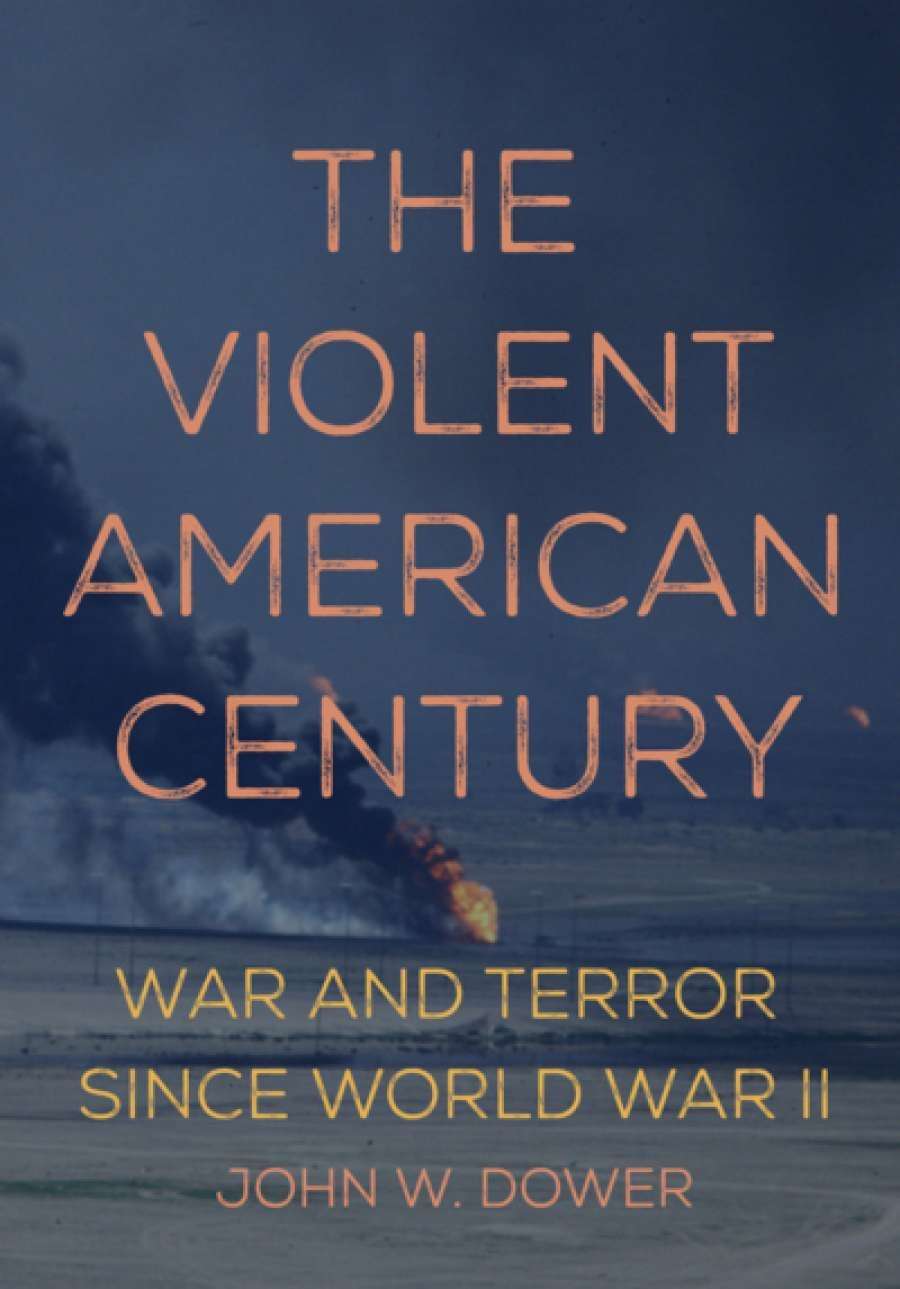
- Free Article: No
- Contents Category: Politics
- Custom Article Title: Alison Broinowski reviews 'The Violent American Century: War and Terror since World War II' by John W. Dower
- Custom Highlight Text:
A week after the Manchester Arena bombing, it emerged in the British media that MI5 had been warned about some of the terrorists but had apparently done nothing. M16, moreover, had reportedly encouraged British Libyans to join the 2011 civil war against Gaddafi. Their relatives, including the Manchester bomber, later went back and forth unimpeded between the United Kingdom and Libya.
- Book 1 Title: The Violent American Century
- Book 1 Subtitle: War and Terror since World War II
- Book 1 Biblio: Haymarket Books, $24.99 pb, 167 pp, 9781608467235
Another distinguished US historian, John W. Dower, describes anti-US blowback as the result of three-quarters of a century of interventionism. Americans, always in the name of peace, freedom, and democracy, have killed many more than the terrorists. The United States has engaged in widespread violence, some of it public and some secret through proxy wars, arms sales, inciting insurrection, or backing authoritarian regimes. US strategic bombing killed and terrified civilian populations in wars in Japan and Korea, and then in Southeast Asia, where American mines and chemical warfare left vast areas devastated. The nuclear ‘balance of terror’ intimidated an earlier generation, but America’s current ‘nuclear modernisation’ is equally terrifying. The United States is not alone, but as Dower shows in his latest book it has led the world in developing instruments of mass destruction, and has funnelled massive resources into a ‘gargantuan, intrusive, and ever-expanding national security state’. Many unpublicised facilities around the world are integrated with CIA ‘black operations’, which since 2002 include targeted assassinations by unmanned drones. For the United States, Dower concludes, fighting terror means creating terror.
 United Airlines Flight 175 crashes into the south tower of the World Trade Center, September 11, 2001 (photograph by Robert J. Fisch, Wikimedia Commons)
United Airlines Flight 175 crashes into the south tower of the World Trade Center, September 11, 2001 (photograph by Robert J. Fisch, Wikimedia Commons)
War against terror does not deliver security. Instead, Dower detects a bipolar disorder in the United States: hubristic and overwhelmingly powerful, yet fearful and insecure. By fomenting anxiety about threats at home and abroad, and always finding new ones, US military planners have for decades ensured that politicians and the public keep footing the bills for the massive, public and private, military and security industry. It is now, says Dower, more ‘cumbersome, compartmentalized, faction-ridden, redundant, wasteful, corrupt and nontransparent’ than ever. Since 1996, the Pentagon’s mission has been ‘full-spectrum dominance’ of land, sea, air, space, and information in every part of the world. In 2015 the US Department of Defense maintained 4,855 ‘sites’ of which 587 were in forty-two countries abroad. Special Operations forces were active in at least 150 countries. About 150,000 US troops in some eighty countries are located in 800 American garrisons, which include 181 bases in Germany, 122 in Japan, and eighty-three in South Korea. Between World War II and 2002, the US engaged in 263 military operations, more than two-thirds of them after 1991. And yet since World War II the massively armed United States has won no wars (apart from Grenada, Panama, the brief 1991 Gulf War, and the Balkan conflict).
Although the United States changes its enemy nations often, and fights some former friends, its identification of individual ‘bad guys’ remains perennially consistent. Dower cites a training manual for covert operations in Latin America which targets ‘religious workers, labor organizers, student groups, and others in sympathy with the cause of the poor’. A revised manual whose preface states that torture is illegal and often counter-productive goes on to instruct trainees in torture techniques. Dower doesn’t discount other countries’ violence and oppression, but America’s record ‘helps place them in perspective’. US exceptionalism and ‘rule of law’ rhetoric are hubristic myths that provoke enmity.
Dower’s important book has two guiding themes. First, overt conflict between major states has since 1945 given way to relative peace, but in other countries civil wars have proliferated, often at US instigation. (Another new book, David Armitage’s Civil Wars, confirms that in parts of Eastern Europe, Asia, Africa, and the Middle East, internal conflict is now the most widespread and destructive form of organised human violence). Second, the ‘American Century’ that Henry Luce confidently proclaimed in 1946 has peaked, and the United States which Donald Trump promises to make great again is declining and may fall.


Comments powered by CComment